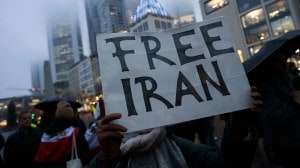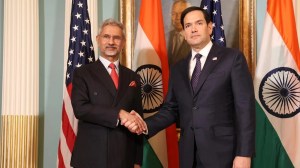Measuring life in pegs
Public euphoria is often a false measure of social well-being. The celebratory postures of society's more articulate sections can hide the t...

Public euphoria is often a false measure of social well-being. The celebratory postures of society8217;s more articulate sections can hide the terrible despair of others who dwell behind the ghunghat of their own helplessness.
So it was when prohibition was lifted in Haryana on April 1. The front pages of Delhi newspapers celebrated the moment uninhibitedly: Happy Days Are Back Again8217;, Liquor Industry in High Spirits8217;, Haryana8217;s Residents Heave a Sigh of Relief8217;, Yo ho ho And a Bottle of Rum8217;, they trilled in an almost tipsy delirium. Similar paeans had emanated from Hyderabad exactly a year ago, after Andhra Pradesh Chief Minister Chandrababu Naidu diluted the prohibition law in his state.
What8217;s interesting in this choice of words is the facile manner in which consensus is achieved. It is, nevertheless, a false consensus, spawned by a potent cocktail of business and personal interests. While we got to know all about the deficit of Rs 600 crore that Haryana suffered as a result of excise revenuelosses, there are no calculators to tote up the daily losses that faceless women and children suffer at the hands of drunken men. It8217;s also easy to forget why tens of thousands of women in this state had endorsed the Haryana Vikas Party8217;s stand on prohibition and voted it in.
The reason for their anger was not far to seek. As excise revenues in this region shot up from Rs 12 crore in 1966 to Rs 400 crore in 1992-8217;93, women in small hamlets dotting districts like Sonepat, who had until now lived behind a purdah, started raising their voices in protest. By 1992, the anti-liquor movement had touched every village in the state. The quantum jump in excise revenue, thanks to hundreds of ahatas, or speakeasies, that came up almost overnight, had everything to do with government policy. In a move to shore up revenue at the local level, the state government had in 1987 generously earmarked a portion of earnings from alcohol sales to village panchayats and municipal bodies.
Haryana Chief Minister Bansi Lal,architect of the HVP8217;s famous victory in 1996, had quickly realised the strength of women8217;s wrath over the rivers of liquor flowing in the state and cunningly used it to rehabilitate himself politically, exactly as N.T. Rama Rao of the Telugu Desam Party did in January 1995.
There are excellent reasons to explain why prohibition gets the sort of support it does from women in regions as disparate as Haryana and Andhra Pradesh, or even Kerala8217;s Moolampally island or Bihar8217;s Gumla district. Life had shown them the links between the growing wealth of the liquor contractor and their own immiserisation, between the bustling liquor den and the hopeless terror of drunken brawls within the four walls of a home.
Liquor has such currency in some parts of the country that it has even, on occasion, replaced the real thing, with landlords resorting to paying wages in the form of arrack sachets. Women in Lingalagattu, a tiny fishing village on the River Krishna once sat down and calculated just how much they and theirfamilies were losing to the bottle: the 200-odd fishermen in that community were found to consume liquor worth Rs 5 lakh annually. What was also as clear as daylight was the nexus between the politician and the liquor baron, a connection symbolised by the ubiquitous plastic sachets of transparent liquid used to mobilise votes during elections.
The politicians8217; response to the issue has ranged from the avuncular to the hypocritical. While they were out of power they inevitably championed the cause, once they were installed in government it was another story altogether. Many opted for the soft option of banning arrack, even while allowing the dispensers of Indian Made Foreign Liquor free play. Chandrababu Naidu did just that last year, after the state publicity department put out carefully argued pieces on how prohibition was damaging the state8217;s financial security. But Naidu should have known the cost of prohibition at the very outset he was, after all, the finance minister in his father-in-law8217;s cabinetwhen prohibition was ushered in with such fanfare.
Tamil Nadu, too, provides an interesting tale of political prevarication. Prohibition was imposed four times in the state after independence, with politicians swinging from attempting to ban liquor consumption to letting it all flow out. In his public speeches MGR, always conscious of his women8217;s constituency, supported prohibition forcefully, but in actual practice gave arrack shops free rein. In 1990, the Karunanidhi government even decided to sell cheap liquor for purposes of 8220;development activities8221;, or so his public relations personnel claimed. Then J. Jayalalitha came to power in 1991, promising to pull the shutters down on liquor shops. She did it all right, while cleverly keeping a window of opportunity open for IMFL traders, who were even allowed to run bars if they so chose.
What you have in prohibition is the classic conundrum of individual rights being pitted against family and community rights. The right of an individual to pursue happinessby imbibing alcohol is a perfectly defensible one. But it must necessarily be seen against the equal right of his or her family to a life of happiness and freedom from fear. If one right infringes grossly upon the other, as when an alcoholic husband beats his wife or drunken youth sexually harass a woman on the street, then it can no longer be justified. The contradiction emerges most starkly in a context where people don8217;t enjoy an equal status. Given the power equations within the average Indian family, women and children in it are clearly powerless to defend their right to family earnings or their right not to be subject to abuse, should the husband or father turn to drink.
The State, therefore, cannot afford to regard alcoholism and drunken abuse as private crimes which do not impinge on the public sphere. Prohibition has not worked. True. But the State must, nevertheless, ensure that women and local communities are given the legal instruments and mental confidence to regulate the trade andconsumption of alcohol. This can be done through a combination of measures, ranging from awareness-raising and deaddiction camps to property rights for women. In the early 8217;90s, the rural women of Andhra Pradesh raised a cry of despair: 8220;Ban liquor or bury us all8221;. It continues to blow in the wind, unheeded.
- 01
- 02
- 03
- 04
- 05































